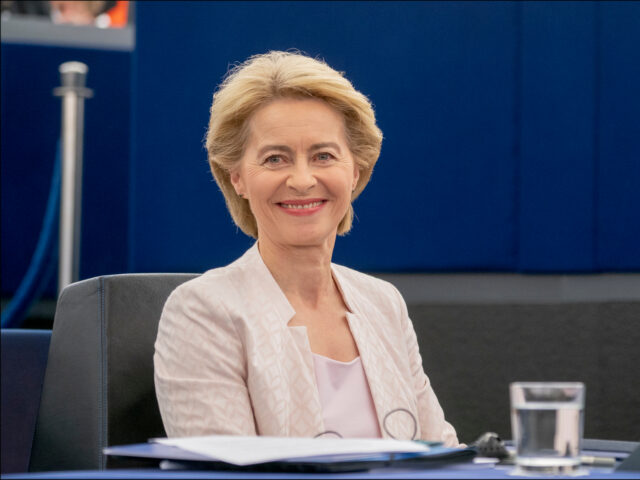Arch-globalist Ursula von der Leyen has been re-elected as the President of the European Commission for a second five-year term by a comfortable margin in the European Parliament on Thursday.
German politician Ursula von der Leyen will continue on as the top woman in Brussels, securing 401 votes for her re-election in the 720-seat European Parliament on Thursday compared to 284 against, Euronews reports.
Prior to the vote, the top globalist said that if given a second term she would double down on key issues, notably the European Green New Deal and the plans to see Ukraine join the European Union.
She also appears set to continue her longtime battle with Hungarian Prime Minister Viktor Orbán, whom she personally signalled out in her speech Thursday over his recent trip to Moscow to advocate for a peace settlement.
Von der Leyen branded the trip as an “appeasement mission” and vowed that Brussels will continue to “give Ukraine everything it needs to resist and prevail”.
Responding to the vote, Spanish populist VOX MEP Jorge Buxadé said that it was a “sad day” for Europe, particularly for farmers suffering under the green new deal agenda of Von der Leyen.
Despite significant gains from conservatives and populists in the European Parliament elections last month, neo-liberal and leftist factions still hold the levers of power in the bloc, with Von der Leyen’s European People’s Party (EPP) group remaining the largest in the parliament with 188 seats, followed by the leftist Socialists & Democrats at 136.
The new European Parliament saw a sharp shift to the right in last month’s bloc-wide elections, with the newly formed Patriots for Europe alliance led by Hungary’s Viktor Orbán and France’s Marine Le Pen currently standing as the third largest group in the parliament with 84 MEPs.
Other right-wing alliances include the Europe of Sovereign Nations led by the Alternative for Germany (AfD) party with 25 members and the centre-right European Conservatives and Reformists (ECR) led by Italian PM Giorgia Meloni with 78 seats.
There were initially suggestions that Von der Leyen may seek an alliance with Meloni’s group to ensure a second term as Commission chief, however, following protestations from greens, liberals, and socialists, such plans were abandoned. While Meloni did not formally endorse her German ally, the ECR group she leads was reportedly given permission to vote as they pleased.
French National Rally MEP and leader of the Patriots of Europe group the parliament, Jordan Bardella criticised centrists and conservatives for backing von der Leyen, saying that his faction in Brussels “will be the only patriotic group resolutely opposed to the Green Deal, the migration pact and the dissolution of our nations.”
After it was revealed last month that Von der Leyen had the backing for a second term from the unelected European Council, Hungarian Prime Minister Viktor Orbán said: “Instead of inclusion, it sows the seeds of division. EU top officials should represent every member state, not just leftists and liberals!”
Von der Leyen has long been a controversial figure, stemming back to her unimpressive stint as German defence secretary, however, she has become the darling on the globalist circuit, often featuring prominently at conferences such as the World Economic Forum’s Davos summit.
As Breitbart London prevoiusly reported:
Von der Leyen, who was installed in her position in a back-room deal cut at the EU Council by Paris and Berlin in 2019, was in some ways essentially groomed for the position. The embodiment of the emergent pan-national EU aristocratic elite, her father served as one of the first civil servants for the European Commission which she now leads. Von der Leyen was also a product of being educated in the elite “European School” in Brussels for the children of international diplomats.
Yet, despite such a lofty background in which she would have supposedly been schooled in the art of governance, she was largely considered as having ‘failed up’ from a disappointing tenure as German Defence Secretary under Angela Merkel, in which she has been accused of having left the German military in “catastrophic” condition.
Her first term as Commission president has also left much to be desired, having presided over draconian lockdown measures during the Chinese coronavirus, spearheading the push for health passports and mass censorship of “disinformation”, for example. This was followed up by Europe being plunged into an energy crisis after being caught off guard by the Russian invasion of Ukraine and ill-equipped to deal with cuts in Russian gas supplies after embarking on the green agenda favoured by Von der Leyen and her allies.
Her term has also been marked by increased attempts by Brussels to police — through monetary pressure — the domestic policies of member states, imposing financial penalties on conservative governments in Hungary and Poland for enacting conservative policies on migration and gender.

COMMENTS
Please let us know if you're having issues with commenting.